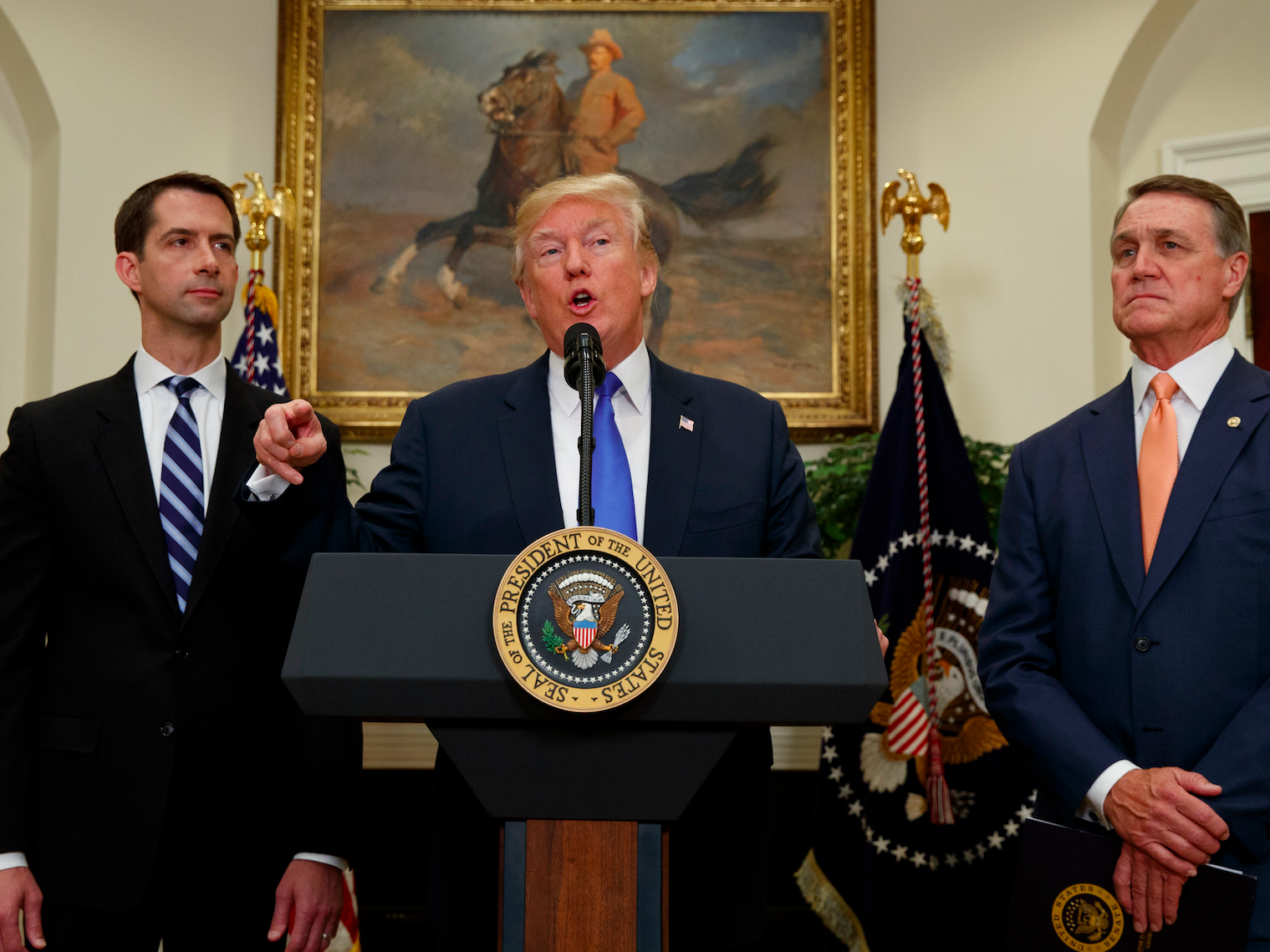President Donald Trump on Wednesday unveiled legislation intended to slash legal immigration to the United States by reducing the amount of low-skilled immigrants who are allotted green cards.
“The RAISE Act ends chain migration and replaces our low-skilled system with a new points-based system,” Trump said in an announcement alongside Republican Sens. Tom Cotton of Arkansas and David Perdue of Georgia, who introduced an early version of the legislation in February.
Trump said the bill would take aim at programs that predominantly admit low-skilled immigrants, which he said has displaced American workers and depressed wages. He added that the legislation is intended to favor green-card applicants who can speak English, financially support themselves, and demonstrate their skills, which he said would “reduce poverty, increase wages, and save taxpayers billions and billions.”
“It will restore the sacred bonds of trust between America and its citizens,” he added of the legislation, which is named the Reforming American Immigration for Strong Employment (RAISE) Act.
Cotton and Perdue’s early version of the legislation had proposed a 50% reduction in annual immigration over the next 10 years, allotting green cards for just 539,958 immigrants in 2027 compared to the 1,051,031 that received them in 2015.
The initial bill, which stalled in the Senate for several months and is being reintroduced with certain changes, called for the elimination of the "diversity visa," would allocate 50,000 visas annually to people from countries with low immigration rates to the US and place a cap on refugee admissions at 50,000 per year.
The bill also proposed to eliminate certain pathways to family-based immigration, stipulating that only spouses and minor children of US citizens and permanent residents would be eligible for green cards.
The legislation has already received significant support from White House officials such as senior adviser Stephen Miller, who helped Cotton and Perdue craft the bill, and chief strategist Steve Bannon, who has long decried legal immigration levels and argued that an influx of Asian immigrants has overwhelmed America's schools and technology sector.
Democrats are unlikely to support a bill that would dramatically reduce immigration levels and cap refugee admissions, but it's unclear how much support it could attract from Republicans.
Sens. Lindsey Graham of South Carolina and John McCain of Arizona, for instance, will likely oppose the measures as they have introduced their own immigration legislation that would provide a path to legalization for undocumented immigrants who were brought to the US as children.
The bill has already been praised by anti-immigration groups, including NumbersUSA and the Federation for American Immigration Reform (FAIR).
"Nothing underscores the failure of our current immigration system like the constant clamoring from the business sector for more 'skilled' workers, while we import over one million immigrants each and every year," FAIR said in a statement Wednesday. "President Trump … should be applauded for recognizing the current dysfunction of our outdated immigration policies that, unlike the rest of the nation, have been stuck in a time warp for the last 50 years."
But immigration advocates seized upon the bill Wednesday, arguing that not only are low-skilled immigrants and refugees essential to America's economy, but the proposed legislation does not actually create a "merit-based system" as Trump said.
"The new Cotton-Perdue bill would do nothing to boost killed immigration and it will only increase the proportion of employment-based green cards by cutting other green cards. Saying otherwise is grossly deceptive marketing," Alex Nowrasteh of the libertarian Cato Institute wrote shortly after the bill was announced.
Critics of the bill also attacked its revisions to family-based immigration, arguing that such measures will dissuade skilled immigrants who would otherwise want to come to the US.
"Restricting family members from joining their families in the US will make it harder for them to become fully American," the National Immigration Forum's executive director Ali Noorani said in a statement. "Cutting legal immigration for the sake of cutting immigration would cause irreparable harm to the American worker and their family."

